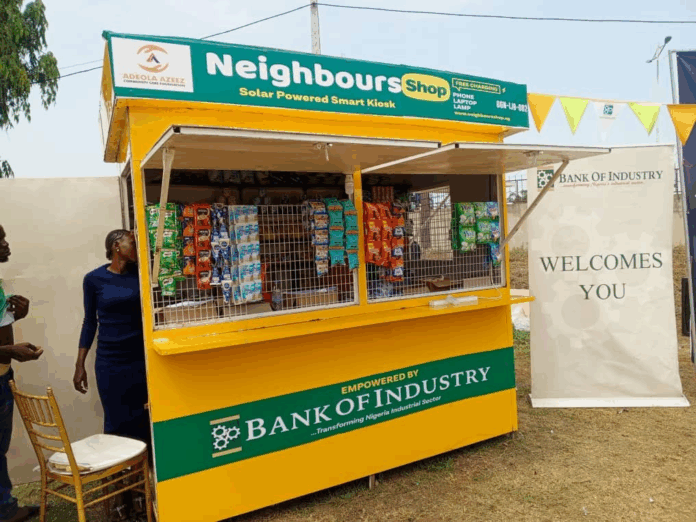Lagos at dawn presents a study in contrasts. Two distinct economies begin their daily routines as the first light filters through the sprawling megacity. In the high-rise offices of Victoria Island, bankers and executives prepare for another day of navigating Nigeria’s turbulent formal economy. Meanwhile, across the city’s labyrinthine neighbourhoods, a different kind of entrepreneur is already working — the kiosk retailer, unfolding weathered wooden shutters and arranging goods efficiently.
These unassuming micro-businesses represent one of Nigeria’s most remarkable economic paradoxes. While the country’s formal economy — Africa’s largest at N477 billion GDP in 2022 — lurches from crisis to crisis, the informal sector continues demonstrating astonishing resilience. The National Bureau of Statistics estimates Nigeria′s informal economy at N40 trillion, accounting for 65% of GDP and employing over 80% of the workforce. At the heart of this phenomenon are the ubiquitous kiosks that dot every street corner, providing economic ballast and vital community services in a nation where systemic failures are the norm.
A paradox unfolds daily in the heart of Lagos, Nigeria’s economic engine. While the nation’s macroeconomic indicators struggle, marked by rising unemployment, persistent inflation, and daunting poverty rates, a quiet revolution is underway on the city’s bustling streets. Here, amid the din of traffic and the sprawl of urban life, thousands of modest kiosks—often little more than wooden shacks or metal containers—dot the landscape. These humble retail outposts, run by resourceful entrepreneurs, are the lifeblood of Nigeria’s vast informal sector, which sustains millions and drives much of the country’s economic resilience and innovation.
Nigeria, Africa’s most populous country and its largest economy by gross domestic product, faces a challenging economic climate. The World Bank’s April 2025 Africa’s Pulse report paints a stark picture: over 106 million Nigerians-about 15% of the world’s extremely poor—live below the $2.15 per day threshold. The report projects that the national poverty rate could surge to 56% by 2027, making Nigeria the country with the highest share of extremely poor people in sub-Saharan Africa. Fueled by spikes in food and fuel prices and a 40% depreciation of the naira in 2024, inflation continues to erode purchasing power, disproportionately impacting the most vulnerable.
Nigeria’s GDP, which stood at $362.81 billion in 2023, is expected to reach $377.31 billion by the end of 2025, with projections of $410.85 billion by 2027. Yet, this growth remains insufficiently inclusive as structural weaknesses, overreliance on oil, and national fragility persist. Oil still accounts for over 80% of exports, a third of banking sector credit, and half of government revenues, leaving the economy exposed to global shocks.
Amid these macroeconomic headwinds, the informal sector emerges as Nigeria’s economic backbone. Recent data reveals that the informal sector employs 76.7% of the country’s workforce, providing essential livelihoods for youth, women, and vulnerable populations. Its estimated value is a staggering N40 trillion, encompassing micro and small enterprises that have contributed between 65% and 80% of the national GDP in recent years. This sector is not merely about survival but a crucible of entrepreneurship and innovation. Digital platforms and gig work have further transformed the informal landscape, democratizing access to upskilling opportunities and formal aggregation for millions.
Nowhere is the dynamism of the informal sector more evident than in Lagos. The city’s estimated 5.5 million informal workers, three-quarters of its 7.5 million labour force, are the engine behind its relentless commerce. In neighbourhoods like Ojota, retail kiosks managed by “mallams” and “abokis” (local terms for kiosk operators) serve as vital hubs for daily necessities, operating almost round-the-clock and providing goods and services that larger supermarkets cannot match in accessibility or flexibility.
“Adamu is more than a trader. He’s a lifesaver,” says a Lagos resident, recalling a midnight dash to a kiosk providing medicine and soft drinks in an emergency—a testament to these micro-entrepreneurs’ indispensable role in their communities.
Setting up a kiosk in Lagos is a study of frugality and ingenuity. The structures are often simple—wooden boxes or metal containers with collapsible windows for display. They require minimal capital, are easy to assemble and dismantle, and operate independently of the unreliable national power grid.
The inventory is a microcosm of Nigerian consumer life: biscuits, candies, over-the-counter medicines, cigarettes, beverages, and an eclectic mix of everyday essentials. The business model is built on proximity, trust, and adaptability—selling on credit to trusted customers, reinvesting profits in farming or family needs, and sometimes even serving as neighbourhood watchmen.
Most kiosk operators start with little capital, sometimes as little as N5,000 to N10,000, sourced from personal savings, gifts, or informal loans from friends and family. A study in Zaria, Kaduna State, found that 41.9% of kiosk entrepreneurs used their savings, 35.4% relied on gifts, and only 22.6% accessed informal loans. Banks rarely lend to these micro-businesses, citing their lack of formal documentation and collateral.
Many operators have no intention of expanding into larger shops. Instead, they reinvest profits in agriculture or family back home, balancing entrepreneurship and subsistence. Some kiosks are inherited and passed down through families, while others are sold or transferred to relatives when the original owner moves on.
Despite their size, kiosk operators are not beyond the reach of local government taxation. In Lagos, annual dues range from N2,000 to N3,000, collected by local councils. The process is not always transparent; multiple groups may demand payment, requiring operators to keep receipts as proof of compliance. Some areas, however, escape regular enforcement, allowing a few operators to avoid these levies altogether. This informal taxation is a double-edged sword: while it contributes to Lagos’ impressive internally generated revenue, it also burdens micro-entrepreneurs already grappling with thin margins and volatile demand.
Successive economic shocks have tested the resilience of kiosk entrepreneurs. The COVID-19 pandemic, for instance, pushed an additional five million Nigerians into poverty in 2020 alone. The World Bank’s Nigeria COVID-19 National Longitudinal Phone Survey (NLPS) tracked the impact on household welfare, revealing widespread job and income losses, especially among those dependent on daily informal sector earnings.
With limited social safety nets, many kiosk operators adopted coping strategies such as reducing consumption, selling assets, or relying on community support. Despite these hardships, the sector’s flexibility and low barriers to entry allowed it to absorb displaced workers and provide a buffer against deeper economic distress.
Recent initiatives have sought to harness the potential of the informal sector for broader development goals. In late 2024, the Bank of Industry, in partnership with NGOs, launched a project to empower 50 young women in Ogun and Lagos States with solar-powered smart retail kiosks. These kiosks, equipped with solar energy, refrigeration, and digital inventory management tools, are designed to foster innovation, environmental resilience, and financial inclusion.
“Each solar-powered kiosk is a hub for innovation, equipped with solar energy, it aligns with our commitment to environmental resilience,” says Mrs. Adeola Azeez, founder of the Adeola Azeez Community Care Foundation.
Such interventions are crucial, as women and youth constitute a significant share of informal sector workers, yet often face barriers to accessing capital, training, and formal recognition.
The digital revolution is reshaping Nigeria’s informal sector. Mobile money, e-commerce platforms, and gig work create new income generation and formalisation avenues. However, a persistent skills gap in digital tools and business development limits the sector’s growth potential.
Policy experts argue that advanced, inclusive, and comprehensive work policies are needed to address the rise of freelancing and gig work, ensuring that the benefits of digitisation are widely shared and that informal workers can transition to more sustainable and dignified livelihoods.
Amid the challenges, there are glimmers of hope. Nigeria’s non-oil exports surged by 24.75% in the first quarter of 2025, reaching $1.791 billion and encompassing 197 distinct products, from manufactured goods to agricultural commodities. The volume of non-oil exports also jumped by 243.44% compared to the previous year, signalling momentum in efforts to diversify the economy away from oil dependency.
Nigeria’s kiosk entrepreneurs exemplify the resilience and ingenuity that define the country’s informal sector. Against economic uncertainty and persistent poverty, they continue to innovate, adapt, and sustain millions of livelihoods. Their story is not just one of survival but of quiet triumph—a testament to the power of small businesses to drive inclusive growth and social stability in Africa’s largest economy.




